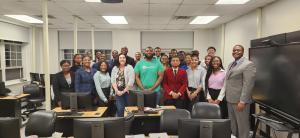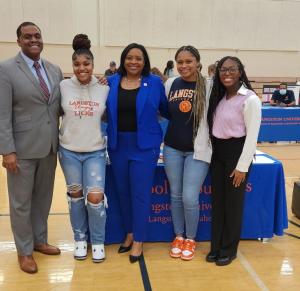AI's Impact on African American Futures: Langston's Professors Illuminate Urgent Diversity Crisis in AI
The AI landscape, dominated by a predominantly white and male workforce, risks perpetuating historical biases and power imbalances. The AI Now Institute's recent research describes the situation as a "diversity disaster," leading to flawed systems that not only replicate but exacerbate gender and racial biases. Examples abound, from image recognition services making offensive classifications of minorities to chatbots adopting hate speech and facial recognition technologies failing users with darker skin colors.
This lack of diversity within AI development directly contributes to the biases ingrained in AI systems. Langston's School of Business experts emphasize that addressing this issue is paramount to preventing the perpetuation of inequalities, combating algorithmic bias, and expanding opportunities for African Americans. Prof. Grayson and the Computer Science Department experts are addressing these challenges on all fronts: first, by maintaining a 98% graduation rate for computer science majors; second, by increasing the visibility of highly competent students through hackathons and codethons, where his students have beaten Ivy League university teams at regional and national competitions; third, by placing students with industry leaders in Fortune 100 companies to offset and combat issues of inequality.
Daryl D. Green, D.S.L., Dean of Langston University's Business School, emphasizes that "this is not just a tech industry problem; it's a societal crisis. As Dean, I am firmly committed to confronting the negative impacts of AI on the African American community. Our computer science professors are dedicated to unveiling insights that challenge the existing narrative and pave the way for a more equitable future." Dean Green is a business strategist, speaker, and noted author with over 27 years of management experience with the Department of Energy; he is the new Dean of Langston University’s School of Business.
He adds that statistics paint a concerning picture. According to the National Science Board, in 2015, women comprised only 24% of the computer and information sciences field. Furthermore, over 80% of AI professors are men, and the report from the AI Now Institute reveals that a mere 15% of AI researchers at Facebook and only 10% at Google are women. This gender disparity mirrors broader problems within computer science, STEM fields, and society.
As stated earlier, negative consequences of bias include image recognition systems producing offensive categorizations of minority groups, chatbots embracing hate speech, and Amazon's technology displaying limitations in recognizing individuals with darker skin tones. The report attributes the biases embedded in AI systems primarily to the industry's pronounced lack of diversity.
Langston University's computer science department, featuring experts like Chair Ralph Grayson, Dr. Richard Osei, Dr. I. Lin Huang, and Professor Mostefa Golbaba, stands at the forefront of AI implications for African Americans and other underserved communities.
Chair Grayson states, "Investing in AI education is investing in yourself. It equips individuals with the tools to shape the world. As AI becomes ubiquitous, understanding its principles is not just an advantage; it's a necessity. The era of AI is here, and with it, a golden opportunity for the black community to embrace its potential." Together, the Langston computer professors are poised to provide valuable insights that challenge the existing narrative and advocate for diversity in AI. Dr. Huang, a seasoned professor with a global perspective, explains, "I have my students working with AI in computer science. AI is a tool. Artificial intelligence involves working with an expert system. The technology has its limitations. It depends on the quality of the inputs." Dr. Huang, a native of Taiwan, has both academic and practitioner experience with technologies; he has an electrical engineering degree. Like other black colleges, Langston brings a unique perspective on technology advancements. Professor Mostefa Golbaba sees the significance of institutions like Langston in serving the needs of underserved communities, especially in technology: “Langston is the only institution in that state focused on the needs of the underserved communities. As we look at AI technologies and automation, we must prepare our students for the future."
As Langston University's Business School steps into the spotlight this Black History Month, it showcases the vital historical role Black colleges like Langston have played in diversifying the AI industry. By sharing unique perspectives and expertise, Langston stands ready to contribute to the national conversation on AI, offering insights that bridge gaps and foster inclusivity.
For Media Inquiries and Interviews with Professor Ralph Grayson:
Contact the University’s Public Relations Office at 405-466-6049 or email Media Relations Specialist Ellie Melero at emerlero@langston.edu.
About Langston University:
Langston University, located in Langston, Oklahoma, is the only historically black college in the state. With a rich heritage of academic excellence, Langston University is dedicated to providing a diverse and inclusive education while fostering innovation, leadership, and community engagement.
Ellie Melero
Langston University
+1 405-466-6049
email us here
Legal Disclaimer:
EIN Presswire provides this news content "as is" without warranty of any kind. We do not accept any responsibility or liability for the accuracy, content, images, videos, licenses, completeness, legality, or reliability of the information contained in this article. If you have any complaints or copyright issues related to this article, kindly contact the author above.



